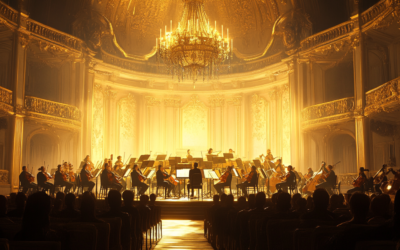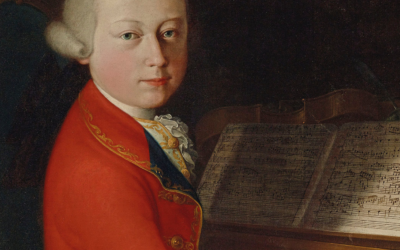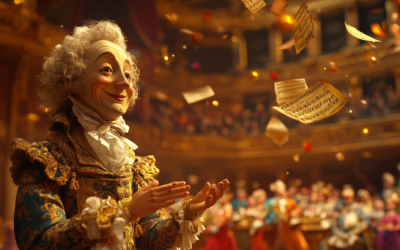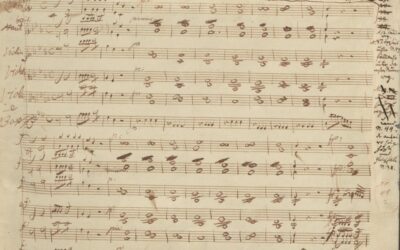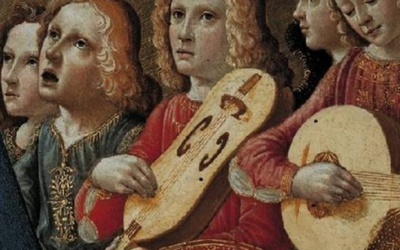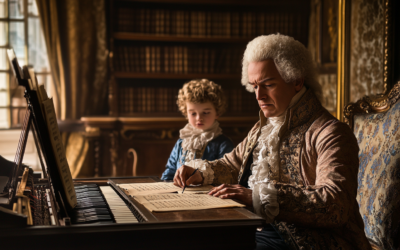The Fabricated Childhood of Mozart
Myths, Manipulation, and a Father’s Obsession
From an early age, Wolfgang Amadeus Mozart’s life was shaped not by an organic artistic development, but by his father’s relentless ambition. Leopold Mozart carefully constructed a narrative of his son as a divine prodigy, fabricating anecdotes, exaggerating talents, and even forging documents to cement the illusion of Mozart’s innate genius. But how much of this legend stands up to scrutiny? When stripped of embellishments, what remains is a child exploited for financial gain, deprived of a genuine education, and forced into the role of a spectacle for European courts. The myth of Mozart’s precocious brilliance unravels when confronted with historical facts, revealing a story far removed from the traditional hagiographies.
The Illusion of Genius and the Reality Behind Leopold’s Strategy
A Carefully Staged Prodigy
From the moment of Wolfgang’s birth, Leopold Mozart saw an opportunity. His letters reveal an immediate fixation on his son’s potential: he saw Wolfgang as a means to achieve the recognition he himself had failed to obtain. Wolfgang was not the first prodigy Leopold had trained—his daughter, Maria Anna (Nannerl), had already been paraded across Europe as a child virtuoso. However, the birth of a son allowed Leopold to escalate his ambitions, this time with even greater determination.
The popular stories of Mozart as a child prodigy with miraculous abilities—transcribing music by ear, composing effortlessly, and dazzling noble audiences with spontaneous improvisations—were largely the inventions of his father. In reality, his early musical training was no different from that of any other well-instructed child, except for the fact that he had an overbearing father who sought to turn him into a sensation.
The “Mozart Notebooks”: A Forgery to Shape a Legacy
Leopold’s desire to control the narrative did not stop at mere exaggeration—it extended to outright fraud. For many years, scholars considered two collections of exercises, known as the Mozart Notebooks, to be authentic evidence of Wolfgang’s early compositional training. However, modern research has revealed that these documents were largely manipulated.
The first notebook, originally intended for Nannerl, contains simple pieces, mostly copied by Leopold himself, which were later falsely attributed to Wolfgang. The second, a so-called composition book dedicated to Wolfgang, was even more problematic. As musicologist Wolfgang Plath demonstrated, this document is a 19th or 20th-century forgery, created to strengthen the myth of Leopold as Wolfgang’s teacher. The added dedication and signature were fabricated long after Leopold’s death.
A Training Based on Imitation, Not Education
Despite claims that Wolfgang was immersed in systematic counterpoint studies from an early age, there is no evidence to support this. The Salzburger Studienbuch, long believed to be proof of his counterpoint lessons, was in reality nothing more than a copied and simplified version of Johann Joseph Fux’s Gradus ad Parnassum, transcribed by Wolfgang at the age of thirty—long after his supposed childhood mastery of counterpoint. Scholars Alfred Mann and Wolfgang Plath have confirmed that neither Wolfgang nor Nannerl received formal instruction in composition.
Instead of a structured education, they were trained in improvisation—a skill that allowed them to entertain audiences in Europe’s courts without requiring the theoretical depth that true composers developed over time. This shortcut served Leopold’s ambitions well, allowing him to market his children as self-taught prodigies, despite the reality that they were performing carefully rehearsed pieces under their father’s strict supervision.
MozartrazoM
“If not for his excessively proud father, he could have nurtured his undeniable talent under the guidance of a proper teacher."
Mozart’s First Performance: A Dancer, Not a Musician
One of the most glaring contradictions in Mozart’s early legend is the nature of his first documented public appearance. Contrary to the romanticised accounts of a five-year-old boy astonishing audiences with his keyboard virtuosity, Wolfgang’s debut was not as a musician but as a dancer in Johann Ernst Eberlin’s oratorio Sigismundus, King of Hungary.
This detail is often overlooked in conventional biographies, as it disrupts the carefully constructed image of Mozart as a divinely gifted musician from birth.
Leopold’s Ultimate Goal: His Own Recognition
Leopold’s tireless efforts to push his children into the limelight were not driven solely by paternal pride. His letters make it abundantly clear that he was primarily seeking personal validation. His disdain for Italian musicians—whom he accused of taking jobs that should have been his—reveals a man who saw his son’s success as his own form of revenge against a system that had never acknowledged him.
When Wolfgang and Nannerl performed in European courts, it was Leopold who penned the glowing reports of their success, often with little external verification. In many cases, no independent records exist to confirm the concerts he described so vividly. The Mozarts’ 1762 performance in Vienna, for example, supposedly took place before Emperor Francis Stephen of Lorraine and Kapellmeister Georg Christoph Wagenseil. Yet, no contemporary accounts mention their presence or reaction. The entire episode relies solely on Leopold’s word, casting doubt on the accuracy of the story.
A Childhood Stolen for Public Spectacle
Rather than nurturing Wolfgang’s artistic growth in a meaningful way, Leopold treated his son as a commodity. The relentless touring schedule, the lack of a well-rounded education, and the absence of rigorous theoretical training meant that Mozart was shaped more as an entertainer than a true musical intellect. His undeniable skills as a performer masked the fact that his compositional development was rushed, haphazard, and heavily managed by his father.
“If not for his excessively proud father, he could have nurtured his undeniable talent under the guidance of a proper teacher.”
This is the greatest tragedy of Mozart’s early years. A young musician with genuine potential was deprived of the proper education that could have turned him into an even greater composer. Instead, he was pushed onto European stages for Leopold’s own gain, his career dictated not by artistic growth but by financial necessity.
For more revelations on the Mozart family’s hidden history, read Mozart in Italy—a groundbreaking investigation into the myths and realities behind one of history’s most manipulated musical figures.
📖 Mozart in Italy: Available now!
You May Also Like
Rediscovering Musical Roots: The World Premiere of Gasparini and Mysliveček
This December, history will come alive as the Camerata Rousseau unveils forgotten treasures by Quirino Gasparini and Josef Mysliveček. These premieres not only celebrate their artistry but also reveal the untold influence of Gasparini on Mozart’s Mitridate re di Ponto. A pivotal event for anyone passionate about rediscovering music history.
The Curious Case of Mozart’s Phantom Sonata
In a striking case of artistic misattribution, the Musikwissenschaft has rediscovered Mozart through a portrait, attributing a dubious composition to him based solely on a score’s presence. One has to wonder: is this music really Mozart’s, or just a figment of our collective imagination?
The Illusion of Canonic Mastery
This post explores the simplistic nature of Mozart’s Kyrie K.89, revealing the truth behind his early canonic compositions and their implications on his perceived genius.
The Unveiling of Symphony K.16
The Symphony No. 1 in E-flat major, K.16, attributed to young Wolfgang Mozart, reveals the complex truth behind his early compositions. Far from the prodigious work of an eight-year-old, it is instead a product of substantial parental intervention and musical simplification.
The Cibavit eos and Mozart’s Deceptive Legacy
The Cibavit eos serves as a striking reminder that Mozart’s legacy may be built on shaky foundations, questioning the very essence of his so-called genius.
K.143: A Recitative and Aria in the Shadows of Doubt
K.143 is a prime example of how Mozart scholarship has turned uncertainty into myth. With no definitive evidence of authorship, date, or purpose, this uninspired recitative and aria in G major likely originated elsewhere. Is it time to admit this is not Mozart’s work at all?


